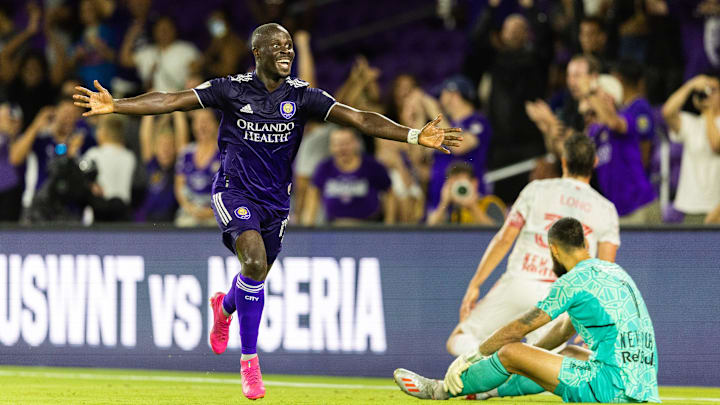In the last two games, most notably the historic 5-1 win over the New York Red Bulls in the US Open Cup semifinals, Orlando City manager Oscar Pareja made a few tactical tweaks to open up the game. The most notable of these adjustments was the decision to play homegrown forward Benji Michel as an out-and-out striker.
After two matches with this new look at the front, let's dive into the strengths and weaknesses of playing Michel as the striker and whether Orlando City should continue this set up moving forward throughout the season.
Pros
Line-breaking pace and runs in behind
When Daryl Dike lead the line for Orlando City, most of the focus was on his insane shot and massive physical presence, but people rarely brought up just how fast he was. Dike was deceptively fast and quick, capable of putting pressure on the backline and running alongside Orlando's pacey wide players like Ruan.
That element of pace on the break has been lacking a bit with Alexandre Pato and Ercan Kara playing most of the minutes at striker. Those two lack the pace and drive to get into the box alongside Facundo Torres and Ruan, forcing Orlando to play slower on the break.
Benji Michel changes that. Michel's pace and direct style of play constantly puts the backline on alert and opens up space for Orlando's creators to do their thing underneath. He creates an outlet when Ruan or Torres run into open space.
Gets the best out of Benji
Benji Michel is a striker. He grew up training and playing as a striker through his youth and college career. This is his natural position. At the professional level he's been forced wide, but even at his best, you can tell he's not a natural winger. With some refinement I still think he could be a Jordan Morris-esque winger in MLS, but he hasn't been anywhere near that level.
As a striker, everything seems a little more natural and Michel is at his best. He doesn't need to be on the ball as much, he can put pressure on the backline and he can get into the box for finishes. This is the best possible version of Benji Michel and he'll only get better the more he plays up top.
Cons
Ercan Kara
Orlando is paying Ercan Kara almost $2 million to be the star striker for the team. He holds one of the team's three Designated Player spots, the most valuable asset on any MLS cap structure. Your DPs HAVE to be good for a team to be good. If Michel starts as the striker, there's no room for Kara in the XI, and that's massive wasted money on the bench.
More importantly than any cap logistics, Kara's been decent this season. His stats aren't groundbreaking, but they're very solid. For a player in his first MLS season with plenty of room to grow over the course of his contract, this is a good debut for Kara.
Perhaps we could eventually see Orlando use a two forward system allowing Michel and Kara to play off of one another, but the roster is designed for a 4-2-3-1 or 4-3-3. There really isn't room for two strikers unless things were to change drastically.
Finishing woes
For all the good Benji Michel does as a #9, he is not a consistent finisher. The DC United game was a perfect example of this, with a really bad miss right on the doorstep. That's the type of high value chance good strikers routinely get and score. Michel did the work to be in position, but fluffed his lines on the finish.
That's supposed to be the difference between a player like Michel and Kara. Kara is paid the big bucks because he should finish 99% of those chances. Statistically, he's a very consistent finisher with 7 goals on 6.5 expected goals in MLS play. Michel by comparison has just 1 goal on 2.4 expected goals.
A striker needs to score goals, and Michel might not have the finishing boots to consistently score goals at an MLS level.
